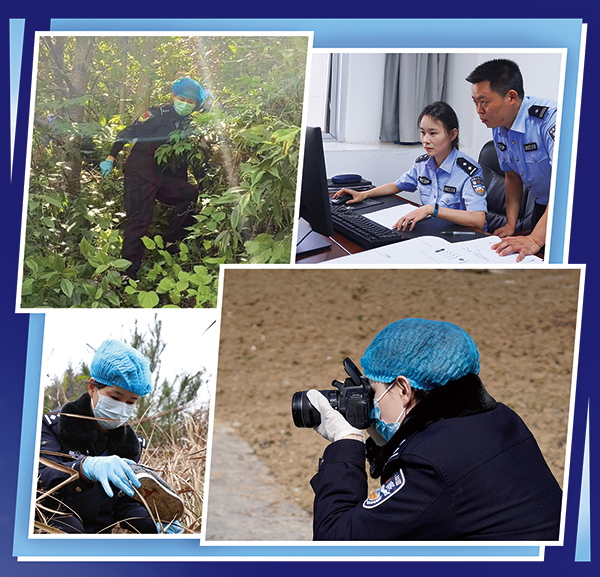

"Someone has fallen off the bridge!"
Upon receiving the call, personnel at the police office in Jianshi county, Enshi Tujia and Miao autonomous prefecture in Central China's Hubei province, immediately sprang into action.
As the leader of the technical squadron of the criminal investigation brigade of the police office, Zhang Hui, 34, rushed to the scene.
She observed that bloodstains were scattered across a set of stairs and among the weeds at the location. However, the body was not found near the area where there would have been the most blood; instead, it had plunged into the river. Zhang also noticed that the deceased had a blackened right eye, suggesting possible internal bleeding due to head trauma.
"This case requires serious attention," Zhang said.
According to her observation, this wasn't a typical abnormal death resulting from a fall accident as described by the caller but potentially a homicide.
The incident occurred in a forest, presenting a vast area for investigation, and piecing together evidence from various traces proved particularly challenging. However, Zhang managed to notice a strip-like mark at the stairs, indicating it might be where the suspect struck the victim's head.
During the examination of the head injury, the medical examiner also discovered on the victim's skin a substance similar to the weeds found at the scene. This finding further supported Zhang's hypothesis that the deceased might have been murdered.
Following a thorough analysis, Zhang and her colleagues confirmed it as a homicide, marking a significant breakthrough in the case.
This intense crime scene investigation ultimately led to the capture of the suspect. It also underscored Zhang's dedication as an experienced criminal investigation expert since 2015 — someone who has encountered various crime scenes, unraveling clues to ensure that criminals are held accountable and victims receive justice.
According to Zhang, unlike the portrayal in detective novels and films, which often emphasize protagonists solving cases through meticulous deduction, real-life criminal cases require a comprehensive analysis, including on-site inspections, interviews, forensic examinations, and more.
"The process of inspecting, fixing, and testing physical evidence challenges an investigator's patience and skills," said Zhang. "Every aspect, from arriving at the scene and forming an initial understanding to analyzing traces and physical evidence during the inspection, is interconnected."
Zhang's exceptional expertise didn't develop overnight. Her keen perception and advanced investigative skills are the result of years of unwavering dedication.
When she first joined the police force, she started with the basics, often struggling to apply the knowledge gained in police school to real-world situations. While carrying out routine tasks like sketching scenes, she would observe her mentor conducting investigations, analyzing scenes, and gathering physical evidence, acquiring invaluable skills in the process.
Upon returning from a call, Zhang not only digitized her hand-drawn sketches but also managed additional daily tasks such as organizing the investigation dossier, arranging collected specimens for inspection, and scanning fingerprint cards for storage.
Zhang patiently progresses through the basic tasks of daily police work, steadily gaining independence.
"At that time, my mentor told me that it takes five years to train a criminal investigation technician, and becoming an outstanding technician takes even longer," she said.
As a female detective, Zhang faces greater challenges in her work than her male counterparts.
According to her, there are few women involved in criminal investigations, with most occupying administrative roles. In Zhang's technical squadron, apart from one female administrative assistant, she is the only female officer.
Working in a mountainous county abundant with rivers, conducting investigations often involves climbing mountains and wading through water, posing greater physical challenges for women.
"The standards for criminal investigation work are the same for everyone, regardless of gender," Zhang said. "It's essential for a police officer to approach their duties with courage and determination."
Zhang and her colleagues also handle many burglary cases. While many of these cases entail relatively small amounts of money and don't involve violent crimes, they often demand extra patience and attention to detail.
Zhang explained that in many theft cases, after the incident, the victim or their families would search the scene first, unconsciously destroying traces and physical evidence. With severe disturbances and many homes lacking surveillance cameras, resolving these cases becomes more challenging.
Zhang and her team have also come across some unique "theft "cases. In rural areas, older people tend not to use electronic payments and prefer to store their cash at home due to the distance from banks. Over time, they often forget where they put their money, leading to reports of "missing" belongings. When Zhang and her colleagues visit these homes, they typically locate the "missing" items right away.
Recalling one particular case in which Zhang's team found the "missing" cash for an old man, she said: "The man was overwhelmed with tears of joy, tightly grasping our hands and expressing gratitude repeatedly. I was deeply touched."
Whether it's major criminal cases or everyday incidents, Zhang and her colleagues tackle each one of them with seriousness and patience.
With nine years of experience as a senior criminal investigation technician, Zhang has examined over 1,200 crime scenes and directly resolved over a hundred criminal cases involving trace evidence.
"Reflecting on those cases, each one presents unique characteristics, tasks, and crucial inspection points. Police officers must demonstrate responsibility and meticulous attention to detail when handling each case to ensure their lasting reliability," she said.